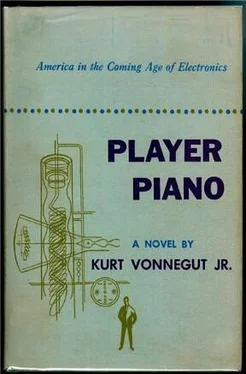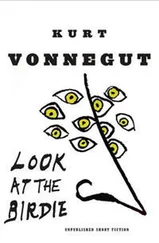"Women do have insight into things that men don't have," she was saying. "We notice important things that men let go by. Kroner wanted you to break the ice about Pittsburgh tonight, and you just -"
"We'll find out what Kroner has on his mind when I call on him. Now, please, let's sleep."
"Finnerty!" she said. "He's the one who threw a monkey wrench into things. Honestly! How long is he going to stay?"
"He'll get sick of us in a couple of days, the way he gets sick of anything."
"The N.I.P.B. mustn't leave him much time to go traipsing over the country to insult old friends."
"He quit. Hasn't got a job."
She sat up in bed. "They fired him! Well, good for them."
"Quit. They offered him a raise to stay. His idea." He found himself awakened by a subject that interested him. Anita's hammering at the subject of Pittsburgh had tended to make him curl up tighter and tighter. Now he felt himself relaxing somewhat, straightening out like a man. Finnerty was a magical name again; Paul's feelings about him had swung a full circle. Morale and esprit de corps, which Paul hadn't felt in any undertaking for years, had sprung up between them in the course of the exhilarating humiliation of Checker Charley. Moreover - Paul's thoughts were coming alive as though refreshed by a cool wind - there was enchantment in what Finnerty had done, a thing almost as inconceivable and beautifully simple as suicide: he'd quit.
"Paul . . ."
"Hmmmm?"
"Your father thought you'd be manager of Pittsburgh someday. If he were alive, nothing would make him happier than to know you got the job."
"Umm hmmmm." He remembered how Anita, shortly after their marriage, had dug up a picture of his father from a trunk and had had it enlarged and framed as her first birthday present to him. The picture was over on his bureau now, where she had put it - where he could see it the first thing in the morning and the last thing at night. She had never met Paul's father, and he hadn't said much about him to her; yet she'd built up a kind of mythology about the man that could keep her talking knowingly for hours. The myth had it that Paul's father in his youth had been just as easygoing as Paul, and that the strength that got him to the top job in the economy came in the middle years of his life - came in the years Paul was just beginning.
Kroner, too, kept alive the notion that Paul could be expected to follow in his father's footsteps. This faith of Kroner's had had a lot to do with Paul's getting to be manager of Ilium; and now that faith might get him the managership of Pittsburgh. When Paul thought about his effortless rise in the hierarchy, he sometimes, as now, felt sheepish, like a charlatan. He could handle his assignments all right, but he didn't have what his father had, what Kroner had, what Shepherd had, what so many had: the sense of spiritual importance in what they were doing; the ability to be moved emotionally, almost like a lover, by the great omnipresent and omniscient spook, the corporate personality. In short, Paul missed what made his father aggressive and great: the capacity to really give a damn.
"What are you going to do about Shepherd?" said Anita.
Paul started to curl up again. "Do? I've already done it. Nothing."
"If somebody doesn't clip his wings, he's going right over everybody's heads one of these days."
"Welcome to."
"You don't mean that."
"I mean I want to sleep."
Her bedsprings creaked as she lay down once more. She shifted her weight about restlessly for several minutes. "You know, it's a funny thing," she said.
"Hmmmm?"
"I've always noticed that when Shepherd turned his face a certain way, he looked an awful lot like somebody else. And it wasn't until tonight that I figured out who it was."
"Mmmm."
"When you see him at just the right angle, he's the spitting image of your father."
PRIVATE FIRST CLASS ELMO C. HACKETTS, JR., approached the Shah of Bratpuhr, Doctor Ewing J. Halyard, of the State Department, Khashdrahr Miasma, their interpreter, General of the Armies Milford S. Bromley, General William K. Corbett, camp commander, Major General Earl Pruitt, division commander, and their aides.
Private First Class Hacketts was in the middle of the First Squad of the Second Platoon of B Company of the First Battalion of the 427th Regiment of the 107th Infantry Division of the Ninth Corps of the Twelfth Army, and he stayed right there, and put his left foot down every time the drummer hit the bass drum.
"Dee-veesh-ee-own -" cried the Division Commander through a loudspeaker.
"Reg-ee-ment -" bawled four regimental commanders.
" 'Tal-ee-own -" cried twelve battalion commanders.
"Cump-neee -" shouted thirty-six company commanders.
"Batt-reeee -" shouted twelve battery commanders.
"P'toon -" muttered a hundred and ninety-two platoon commanders.
"Hacketts," said Private First Class Hacketts to himself.
"Halt!"
And Hacketts did, hut, two.
"Ri-yut -" said the loudspeaker.
"Right, right, right, right, right, right . . ." echoed two hundred and fifty-six voices.
"Right," said Private First Class Hacketts to himself.
"Fay-yuss!"
Hacketts faced right, hut, two. And he stared into the small, bright eyes of the Shah of Bratpuhr, spiritual leader of 6,000,000 people somewhere else.
The Shah bowed slightly from the waist.
Hacketts did not bow back because he wasn't supposed to and he wasn't going to do a goddamn thing he wasn't supposed to do and he had only twenty-three more years to go on his hitch and then he was through with the Army and the hell with it, and in twenty-three years if some sonofabitching colonel or lieutenant or general came up to him and said, "Salute me," or "Pick up that butt," or "Shine your shoes," or something like that he'd say, "Kiss my ass, sonny," and whip out the old discharge and spit in his eye and walk away laughing like crazy because his twenty-five years was up and all he had to do was hang around with the old gang in Hooker's in Evansville and wait for the old pension check and to hell with you buddy because I don't have to take no crap from nobody no more because I'm through and -
The Shah clapped his hands delightedly and continued to stare at Private First Class Hacketts, who was a huge, healthy man. " Niki Takaru! " he cried, exhaling a strong effluvium of Sumklish.
"No Takaru! " said Doctor Halyard. "Sol-dee-yers."
" No Takaru? " said the Shah in puzzlement.
"What's he say?" said General of the Armies Bromley.
"Said they're a fine bunch of slaves," said Halyard. He turned to the Shah again and waggled his finger at the small, dark man. "No Takaru. No, no, no."
Khashdrahr seemed baffled, too, and offered Halyard no help in clarifying the point.
" Sim koula Takaru, akka sahn salet? " said the Shah to Khashdrahr.
Khashdrahr shrugged and looked questioningly at Halyard. "Shah says, if these not slaves, how you get them to do what they do?"
"Patriotism," said General of the Armies Bromley sternly. "Patriotism, damn it."
"Love of country," said Halyard.
Khashdrahr told the Shah, and the Shah nodded slightly, but his look of puzzlement did not disappear. " Sidi ba - " he said tentatively.
"Eh?" said Corbett.
"Even so -" translated Khashdrahr, and he looked as doubtful as the Shah.
"Lay-eft -" shouted the loudspeaker.
"Left, left, left, left, left, left . . ."
"Left," said Hacketts to himself.
And Hacketts thought of how he was going to be left alone in the barracks this week end when everybody else was out on pass because of what happened in inspection that morning after he'd mopped and squeegeed the floor and washed the windows by his bunk and tightened up his blankets and made sure the tooth-paste tube was to the left of the shaving-cream tube and the tube caps both pointed away from the aisle and that the cuff on his rolled-up socks pointed up in his footlocker and that his mess kit and mess cup and mess spoon and mess fork and mess knife and canteen were shining and that his wooden rifle was waxed and its simulated metalwork blackened and his shoes shined and that the extra pair under his bunk were laced to the top and tied and that the clothes on his hangers went: two shirts, O.D.; two pants, O.D.; three shirts, khaki; three pants, khaki; two shirts, herringbone twill; two pants, herringbone twill; field jacket; dress blouse, O.D.; raincoat, O.D.; and that all the pockets were empty and buttoned and then the inspecting officer came through and said, "Hey soldier, your fly's open and no pass for you," and -
Читать дальше








![Курт Воннегут - Вампитеры, фома и гранфаллоны [litres]](/books/397997/kurt-vonnegut-vampitery-foma-i-granfallony-litre-thumb.webp)